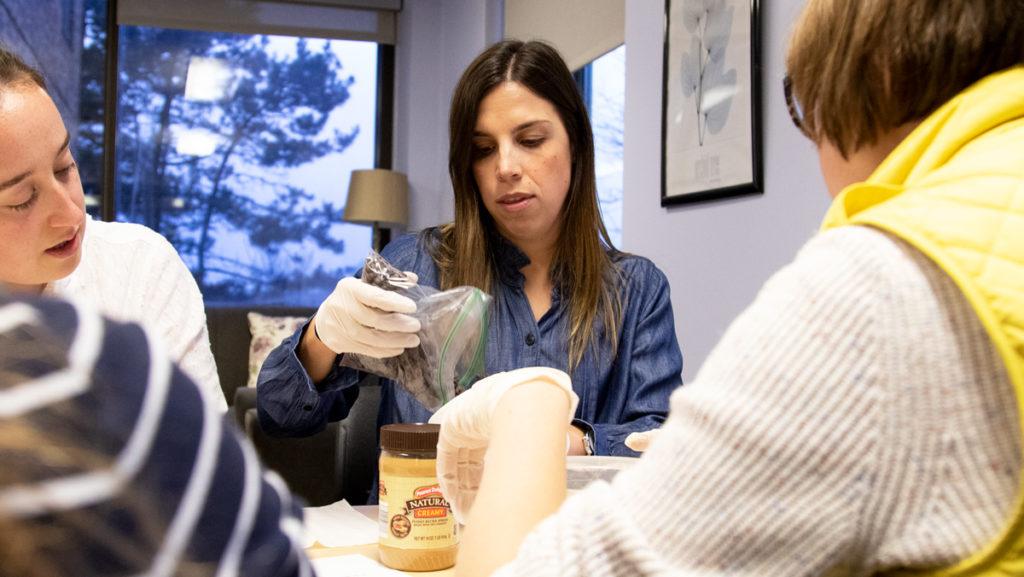The aroma of chocolate and the sounds of laughter fill a small room in Smiddy Hall on Ithaca College’s campus. Mixing up the ingredients to make puppy chow, a group of ICreate graduate clinicians and clients work together to make this treat and practice social skills.
This activity is a part of the Ithaca College Ready to Expand/Explore All Transition Experiences (ICreate) program, which offers adolescents with autism the opportunity to learn how to deal with daily situations to prepare them for adult life. The program launched in Fall 2014 and is run by Tina Caswell, clinical assistant professor in the Department of Speech-Language Pathology and Audiology, and Jana Waller, clinical assistant professor, fieldwork coordinator and chair of the Department of Speech-Language Pathology and Audiology. The goal of the ICreate program is to ease the transition process for individuals on the autism spectrum from high school to college or to a professional career, Caswell said.
Approximately five clients from Tompkins County and surrounding counties ranging in age from 15 to 19 participate in ICreate every year, Caswell said. Graduate students from the college work with the clients for one semester. They work with the clients for one hour every Tuesday and Thursday for 12 weeks in the fall semester. Then, in the spring semester, two new graduate students are chosen to work with ICreate.
Christine Sikora and Melissa Potter, second-year graduate students in the speech-language pathology program (SLP), are working with ICreate for Fall 2019. Both requested to be a part of ICreate to fulfill their clinical hours requirement, which goes toward their professional development and speech-language pathology licenses.
“Every day, Christine and I leave with a big smile,” Potter said. “It is so much fun to work with these people. … They always bring up unexpected ideas that are outside of the box that we might not be thinking of. I think that’s something that’s really unique about people with autism.”
Caswell supervises the graduate clinicians who participate in ICreate as a part of their curriculum.
ICreate is currently holding its first food drive to teach the students the importance of helping others in need. The food drive is running from Nov. 14 to Dec. 5 to help those in need in the Ithaca area. It was started as a collaborative idea among the graduate students and an ICreate autism spectrum disorder (ASD) client and her family.
Sikora said the client’s family wanted to do something about the client’s love of helping others but was unsure how to do so. After settling on the idea of a food drive, Sikora said that she and Potter decided to incorporate the concept of giving back in one of the ICreate sessions with an activity on gift giving.
The activities at the ICreate sessions include role-playing real-life situations involving interacting with other people. Potter said it prepares the clients to become more familiar with these activities in a safe space. If they say or do something that is often considered socially unsuitable, they can talk about it and work through it.
The sessions are structured in five steps. In the first step, greetings, the students and clients talk about their days. In the second step, introduction, students explain to the clients the activity they will be doing that day. In the third step, learning modules, students explicitly teach and model the activity. In the fourth step, teamwork, the students and clients work together on the activity. Then, the group shares reflections and plans for the next session.
In every session, the group focuses on building social communication skills to improve an individual’s ability to become employed or to go onto higher education.
“The most important part, the impact on the clients, is that they feel validated and supported in a safe environment to be able to practice their social communication skills,” Caswell said. “They’re different in the way they communicate, and that’s OK.”
Adolescents with ASD need explicit instruction and predictable environments to learn to navigate social interactions successfully, Caswell said. The activities are primarily group–oriented and collaborative in order to promote social skills. Skott Jones, associate professor in the Department of Speech-Language Pathology and Audiology, said the challenge of forming deep relationships is a main issue in individuals with autism disorders.
“It helps to bridge that transition into adulthood and fosters how do you develop relationships, how do you work together with people, even with pragmatic deficits,” Jones said. “We teach those tools and strategies. Here are some things you can do. Here are some questions you can ask. And then that can lead to friendships and other areas of their lives to make a better quality of life.”
Jones teaches Introduction to Autism: What It Is and Isn’t, a class that defines the disorder and its characteristics.
Jones said approximately one in five children on the autism spectrum lives independently after high school. He said that, statistically, students with autism are less likely to be employed and more likely to be employed in low-paying jobs and live at home with their families.
“For me, it’s all about viewing the individual first, their disorder second,” Jones said. “There is a difference between knowing the kind of disorder a person has and knowing the person who happens to have a disorder.”








